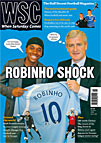 Football and pop music used to be largely separate. David Stubbs has mixed feelings about their rapprochement
Football and pop music used to be largely separate. David Stubbs has mixed feelings about their rapprochement
In manlier days of grit and ore, when footballers were hewn from the same quarry stone as the two up, two down terraced houses in which they lived their entire lives, football and rock’n’roll were considered entirely separate provinces. One was a world of dubbin, screw-in studs, short back and sides and thick-knit, hooped socks. The other was a world of floppy fringes, cappuccino froth, portable Dansette players and young men on motor scooters up to no good.
Of course, there were football fans who liked pop music and vice versa, but the idea that they should form some sort of synergy was unthinkable. True, Liverpool fans sang Beatles songs as if the burgeoning success of the Reds was part of the same upward thrust that propelled Can’t Buy Me Love to number one. However, the Beatles made no attempt to publicise any great love of football (Paul was a discreet Evertonian, who attended the 1968 FA Cup final) and certainly didn’t incorporate it into the weave of their work. The Rolling Stones, who in 1990 broadcast the England v West Germany World Cup semi-final before an open-air gig, were far too cool in 1966 to be seen to be cheering on Nobby Stiles et al.
The same very much went for the majority of the glam and prog rockers who came along in their wake, although Pink Floyd did briefly sample the sounds of the Liverpool kop on their Meddle album. Elton John had his Watford, Rod Stewart his Scotland, for sure, and John Peel always made a point of reading out the football scores at festivals like Reading and Buxton, though to many of the assembled cross-legged, heavy-lidded hairies, he might as well have been reading out the results of Crufts, so irrelevant were they to them – he was booed for his efforts. After all, come the Utopia promised in the extended solos of Curved Air, there would be no League football, or if there were, it would be 22 men working as one to achieve a mind-blowing and beautiful score draw.
Slade were a reaction against such proggishness and purported to appeal to more of a football fan’s mentality, but didn’t play up the connection too much in an era when the game was enduring the first pangs of pariah status. Such music as did accompany football, in themes and chants, was punchy, working-men’s club-oriented, brassy, choral stuff – not terribly psychedelic.
Punk would eventually reconfigure this relationship, as it did so many things. It wasn’t immediately evident with the Sex Pistols (although their drummer Paul Cook was a solid defender for a formidable pub team into the early 1990s). However, one of the effects of punk was to scale down rock’s sense of grandeur and remoteness, and with that came a strengthening of the links between football and music. Footballers such as Pat Nevin and, to a lesser extent, Charlie Nicholas made much of their love for groups such as the Cocteau Twins, Simple Minds, U2. By 1990, and the World Cup, with New Order providing the theme for World In Motion and John Barnes rapping, football and music had found a just about acceptable means of feeding off one another. As well as the Stones, even those of a vaguely Gothic persuasion got in on the act – Robert Smith appeared on the front of Melody Maker in footballing garb, while I attended England games in the early 1990s with both Smith and the Mission’s Wayne Hussey.
Come the mid-Nineties, and the football/music relationship took on the air of out-and-out laddishness. Skinner and Baddiel’s and Ian Broudie’s Three Lions summed up a momentary confluence between football and music – there was a swagger, a hip if lairy optimism momentarily in the air. Danny Baker and Gazza. Robbie Williams and Jarvis Cocker at five-a-side tournaments. Oasis loving Man City, Damon Albarn of Blur unabashedly and faux-geezerishly supporting Chelsea and even doing the Parklife thing for real, playing in a kickabout on Regent’s Park every Sunday.
Today, the football/music relationship has, if anything, been over-cemented. As an Arsenal fan, it sank the spirits when they trotted out to Fatboy Slim’s Right Here, Right Now – it’s the sense of compulsory excitement you resent, and also the sense that such excitement has to be manufactured with a piece of pumped-up pop, rather than naturally generated. Similar scenarios are repeated up and down the country. And no TV highlights package can go unsoundtracked by some compressed, processed instrumental melange of funk, punk and metal – ditto every YouTube football clip, ruined by the uploader feeling that they haven’t done their job unless they swamp it in rap, reggae or portentous orchestral swagger. It’s like adding ice cream to gravy.
I fondly recall an abortive 1992 attempt by Sky to jazz up football, persuading the Shamen to perform Ebeneezer Goode at half-time during an Arsenal v Man City game to the dancing accompaniment of the “Sky Strikers”. This was greeted with such antipathy by fans that had tigers appeared from the tunnel and chewed the group to death it would have raised a bigger cheer than Ian Wright’s winning goal. That was the spirit. We need it back – right here, right now.
From WSC 260 October 2008